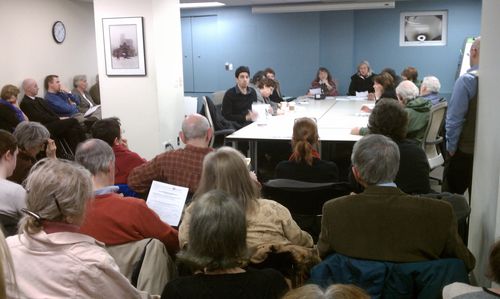Aaron Biller, president of the community group Neighborhood in the Nineties, speaks out against the homeless shelter at the community board protest.
James writes:
Hundreds of Upper West Siders packed the small conference room of the Community Board 7 tonight for what was supposed to be a face-to-face with New York City's Department of Homeless Services and Samaritan Village, the people attempting to open a 200-bed men's shelter in a tourist hotel on West 94th Street. The hotel is being forced to close thanks to disastrous legislation in Albany that had been trumpeted by this community's local representative, Councilwoman Gale Brewer. (Go here for the complete story.)
Peter Thorne from WPIX Channel 11 showed up, along with several newspaper and online writers--only thing is, the Department of Homeless Services and Samaritan Village declined to appear. The meeting therefore did little to answer residents' concerns about why a shelter has been proposed for a family neighborhood, a block from a school, that is already saturated with such facilities (and where few residents but the politicians had a problem with the tourist hotels). As one resident, Miriam, said in her statement to the board: "this has become a middle-class family neighborhood. People have put their blood, sweat, and tears into this neighborhood." Why, she wondered, should taxpayer money go to undermine the sweat equity and investment that residents have spent restoring their neighborhood by paying for a homeless shelter to move in?
One answer came from a representative from the office of Congressman Jerry Nadler, once a resident of 94th Street himself. City government is able to offer lavish deals to landlords to use their buildings as "emergency" shelters because the city can tap into Federal money from the US Department of Housing and Urban Development. Such a story goes to show the damage that wasteful federal dollars can do to a local population when used to override market conditions. Through federal taxpayer money, each of the SRO's tiny rooms could be rented for homeless use at thousands of dollars a month, above market demand. That's a powerful calculus. As one resident put it to me, associates in his law firm can't afford to live on the Upper West Side, but thanks to sweetheart deals from the Feds, a large homeless population can.
Councilwoman Brewer herself declined to show for the meeting. Several questions therefore remain unanswered, for the DHS, and for Brewer:
1. Can the shelter be fought on legal grounds? Is the shelter consistant with the requirement of "permanent housing" stipulated in Albany's legislation?
2. Could anything be done, through rezoning, to allow the hotels to continue operation? If tonight's protest is any indication, only the SRO Law Project (Brewer's advocacy group) and the hotel workers union have a problem with them.
3. What can be done to have the permanent tenants of the hotel stay put, which could prevent the shelter from moving in? Some have been offered $50,000 each to vacate their apartments.
4. How much did Gale Brewer know, and when? Faced with community unrest, Brewer has attempted to reposition herself as an opponent of the facility. She should be applauded for taking this position, but Homeless Services has reported that Brewer's office was in communication about the proposal before it was first announced to the public.
5. If Brewer knew about it, why did she do nothing to stop it before it became a done deal? Were her actions guided by union pressure or a backroom deal with the city to deliver the shelter to DHS, which has now backfired.
6. The Upper West Side has become a centrist community. When will the neighborhood start seeing local and state representation that is more in line with their interests (rather than merely the interests of trade unions--see Brewer's own friends list). The radical control of the Upper West Side's Democratic Clubs cannot be sustained now that the neighborhood's voters have realized the damage that bad legislation, proposed by their representatives, can do.

The tense scene at tonight's meeting.
Peter Thorne has filed an excellent report on the DHS disappearing act for WPIX 11. Full story here:
UPDATE! Reports continue to come in:
Leslie Albrecht of DNAinfo on the DHS no-show (including a cameo by yours truly in the brown plaid shirt)